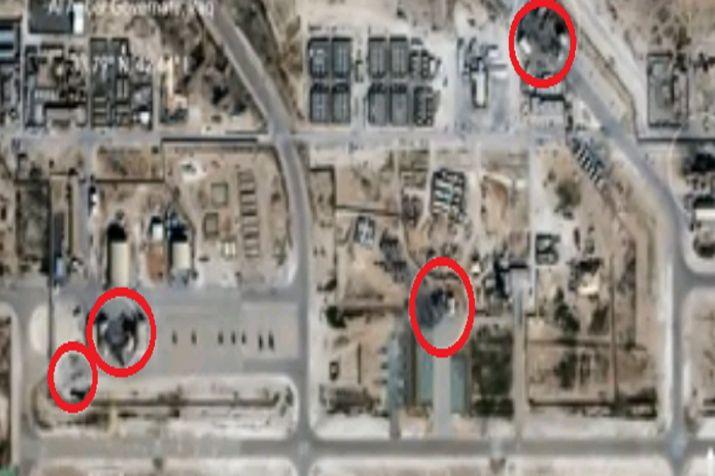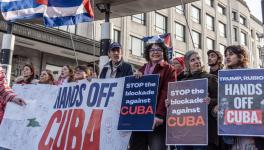Iran: Nothing is Forgotten, Nothing is Forgiven

Satellite images show extensive damage to Ain Al Asad air base in Iraq which was hit by Iranian missiles on Jan 7, 2020
President Trump’s credibility is so low that it is difficult to contest the perception that he blundered into the recent confrontation with Iran by ordering the killing of Qassem Soleimani, the head of the Quds Force. Many analysts point finger at US Secretary of State Mike Pompeo for persuading Trump against his better instincts.
However, Soleimani’s murder was a calculated move. At its core, this murder signals the US’ determination to bring Iraq into its orbit, the unfulfilled agenda of the 2003 invasion. It is useful to recall that the New American Century project had aimed at regime change in Iran once Iraq was stabilised.
But the project got derailed, culminating in the decision by the former President Barack Obama to retrench from Iraq. The follow-up to the 2003 invasion got botched up partly due to the flawed US approach but principally on account of the brilliant game that Iran played by cooperating and competing with the US on the Iraqi turf, while in reality systematically undermining the American occupation and establishing itself as the predominant player.
If Iran succeeded brilliantly in evicting the American forces from Iraq, the credit must go largely to Soleimani who cast his net wide and networked with virtually the entire spectrum of Iraqi opinion — Shi’ite, Sunni and Kurds — and created a vast reservoir of “anti-Americanism” that gave buoyancy to the resistance groups he built up, which bled the US troops in a war of attrition.
Under the Trump administration, the US has staged a comeback. The ISIS’ emergence in Iraq provided the alibi for the return of US troops to Iraq but the American military presence in Iraq is for the long haul, as evident from the creation of new military bases costing billions of dollars.
There is a qualitatively different situation today in comparison with the Bush or Barack presidency, insofar as the US has copied from Soleimani’s rule book — marshalling sections of the Iraqi opinion. There is much social discontent over the dysfunctional government in Baghdad, which provides a fertile ground for the US to expand its political networking.
Meanwhile, the US encouraged Saudi Arabia to restore its diplomatic ties with Iraq. The Saudi diplomacy targets the Sunnis who feel “disenfranchised” in the Shi’ite-dominated Iraqi national life.
Arguably, there is some basis to Tehran’s allegation that the recent waves of protests sweeping Iraq — especially protestors burning down the Iranian consulate in the southern city of Najaf in November — were instigated by the US and Saudi Arabia.
The recent period witnessed the US and Iran locked in a grim struggle over the formation of the next government in Baghdad.
To cut a long story short, the killing of Soleimani removes from the arena Iran’s ace kingmaker in Iraq. Interestingly, the Pompeo telephoned the incumbent Iraqi PM Prime Minister Adil Abdel-Mahdi on Thursday and underscored that “the United States will do whatever it takes to protect the American and Iraqi people and defend our collective interests.”
Pompeo signalled to Baghdad and Tehran that Washington intends to press home the advantage stemming from Soleimani’s murder.
Incidentally, along with Soleimani, the US missile attack also killed Abu Mahdi al-Muhandis, who was literally the lynchpin of the Iran-backed Popular Mobilisation Force comprising virulently anti-American militia groups operating in Iraq.
Pompeo’s triumphalist message implies that the US now sees the Iran-backed militia groups as headless chicken.
President Donald Trump’s remarks on January 8 contain four key elements. First, the “maximum pressure” strategy against Iran will be further intensified with a view to putting the Iranian regime on the back foot. Second, Washington will make a renewed pitch to kill the 2015 Iran nuclear deal so that a unified western stance against Iran can be forged.
Third, Trump intends to enlarge this struggle beyond a US-Iran standoff. He said out of the blue: “Today, I am going to ask NATO to become much more involved in the Middle East process.”
Clearly, the US hasn’t given up on the old project to transform NATO as a global security organisation, which the alliance’s Lisbon summit (2010) had mooted.
Yet, it remains to be seen how far the US’ NATO allies would want to go in such a direct in the prevailing circumstances in the transatlantic relationship. The recent London summit of NATO (2019) had stressed the allaince’s future role in providing underpinning for the member countries’ energy security. Iraq is a test case.
Equally, the London summit endorsed the US perspective on Russia and China being the NATO’s principal adversaries. Clearly, a geopolitical contestation is building up in the Middle East, which will have serious consequences for US global strategies, especially its India-Pacific strategy and relations with Russia.
Fourth, Trump claimed that “options in the Middle East became available” for the US, because “We are now the number-one producer of oil and natural gas anywhere in the world. We are independent, and we do not need Middle East oil.” Trump concluded that the US will not hesitate to use military force to advance its Middle East strategy.
Trump is bluffing. ExxonMobil has been struggling to get. control over Iraq’s vast oil reserves in the Shi’ite southern regions. What Trump overlooks is that the US’ shale industry has an uncertain future. Again, oil is not only about energy security for the US economy; it is also about petrodollars and the status of the American dollar as the world currency.
Thus, a pliable government in Baghdad that can be manipulated to serve American mercantile interests is an imperative need for the Trump administration’s “America First”.
How realistic is Trump’s rhetoric? The US faces difficulties in mobilising European support. Germany on Friday joined Britain and France in saying it wants to save the 2015 nuclear accord with Iran, rejecting Trump’s plea for Europeans to quit the pact. Meanwhile, in Washington, the House of Representatives passed a new resolution Friday attempting to limit Trump’s war powers against Iran.
Trump spoke eloquently about the US military capabilities to threaten Iran. While this may impress Trump’s domestic audience, the fact of the matter is that Tehran has dealt a heavy blow to US Army reputation. How often have US bases come under attack from ballistics missiles from another country in peace time since Pearl Harbour?
Satellite photos show extensive damage at the Ain al-Assad air base. The plain truth is that Trump backed off.
The Iranians will not be cowed down by Trump’s threats. They have been here before — more than once, in fact. The “revenge” is indeed coming.
What lies ahead is a proxy war in third countries — Iraq, in particular. Tehran wields vast influence in Iraq. This will not get eroded easily after Soleimani’s murder. In fact, the compass that Soleimani set in resistance politics will remain unchanged.
Even American analysts have been honest enough to acknowledge it. (See an excellent analysis by Kenneth Pollack at the American Enterprise Institute entitled Soleimani spun a web of Iranian influence that will long outlive him.) All of the US propaganda caricaturing Soleimani as a “terrorist” cannot obfuscate this political reality.
According to a statement released by the Iraqi premier’s office on Friday, in the phone call with Pompeo late on Thursday, Abdul-Mahdi “requested that delegates be sent to Iraq to set the mechanisms to implement the parliament’s decision for the secure withdrawal of forces from Iraq”.
Also on Friday, Iraqi cleric Moqtada al-Sadr called on local and foreign resistance groups to unite and offer resistance to the US. He said the security agreement with the United States should be cancelled immediately, the US embassy should be closed down and US troops must be expelled in a humiliating manner.
Get the latest reports & analysis with people's perspective on Protests, movements & deep analytical videos, discussions of the current affairs in your Telegram app. Subscribe to NewsClick's Telegram channel & get Real-Time updates on stories, as they get published on our website.























